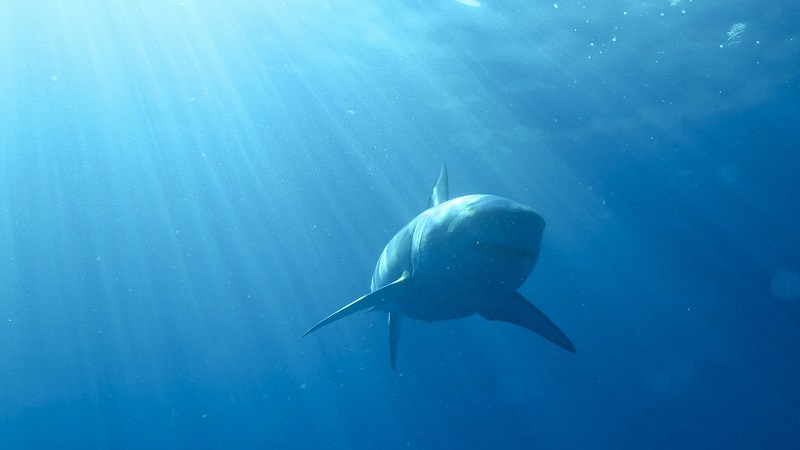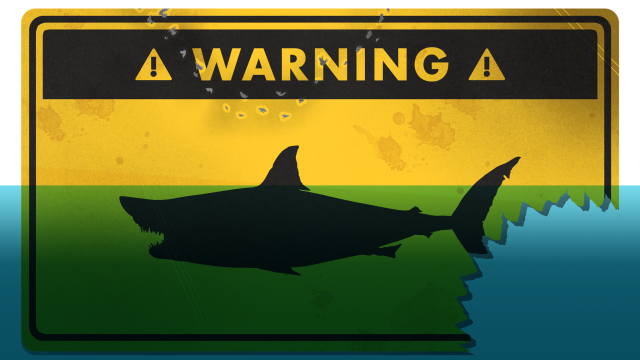Sharks don’t really like the taste of people, but their poor vision and the splashing of beachgoers can lead to sharks confusing you for a tasty snack. Here’s what you should do if you see a fin and the Jaws theme starts playing.
Illustration by Sam Woolley. Photo by Elias Levy.
If you don’t want to see fins circling while you surf, it’s best to stick to safer waters. According to shark expert Richard Peirce, the former chairman of Shark Trust, it’s best to avoid swimming near river mouths and fishing boats. Peirce says fishing operations of any size are prime shark attractors. Hooked fish bleed into the water, and that attracts sharks. Even a small fishing boat will toss dead fish and fish parts, or chum, into the water. It’s also a bad idea to let yourself bleed or urinate in the water for the very same reason. And if you can, avoid swimming in the ocean early in the morning or late at night. Peirce says most shark attacks happen at those times because they have reduced visibility and will mistake people for prey.
There are 15 shark attacks per year in Australia on average, with three recorded fatalities per year. So while shark attacks aren’t an everyday occurrence, they’re on the rise, and they happen often enough that people who spend a lot time in the ocean are always on the lookout for ways to keep them away.
“Shark repellent” is a liquid extract you spray on yourself that’s made from putrefied shark remains. The idea is that nearby sharks smell their dead friends and decide they don’t want to eat you. It works pretty well — even the Mythbusters say so — but these sprays are expensive and make you stink like, well, dead shark, so it’s not ideal for a fun day at the beach. Other methods, like the Shark Shield, use electromagnetic fields to keep sharks away. When sharks encounter these fields, the electrical receptors make them feel intense discomfort so they leave the area unharmed.
Again, these have proven to be somewhat effective, but they cost around $800, and are really only used by deep sea divers or commercial fisherman. Truth be told, humans do far more harm to sharks than they do to us since we hunt them in order to make soup, lubricants and leather.

But if you do have a run-in with one of the most effective killing machines on Earth, stay chill. According to Peirce, splashing around wildly is just going to excite the shark and make it more interested. It doesn’t want to eat you, but it might get curious. For all the shark knows, you could be a seal or large fish. Unfortunately for you, the only way sharks can interact with things is with their razor-filled mouths, so splashing like crazy might earn you an “exploratory bite”.
Once you regain your composure, here’s what else Peirce says you can do:
- Stay facing the shark and maintain eye contact. If you can put your back to something, like a coral reef, do so. Sharks are ambush predators and may lose interest if you show that you’re aware of its presence.
- Curl up into a ball if it looks like it’s just passing by. This makes you look smaller and less like something that can compete with the shark for food in the area. If it’s making a beeline for you, though, make yourself look as big as possible.
- Gently try to swim away backwards toward the shore.
If the shark attacks, George H. Burgess, director of the Florida Program for Shark Research, suggests you try and put something in between you and the shark if you can. A surfboard, boogie board or flotation device will do. As it makes a pass at you, try to strike the shark anywhere you can. This will startle the shark and may buy you enough time to get out of the water.
If the shark bites you and won’t let go, poke the shark hard in the eyes or gills since those are very sensitive. As soon as it lets you go, get to shore as fast as possible and seek medical attention.
This is part of Lifehacker’s Animal Attacks Series. As capable as we humans think we are, bears, snakes, wolves, sharks and even bees can turn a fun day outside into a harsh, potentially life-threatening reality check. Here’s what to do when you find yourself face to face with some of the deadliest beasts in the great outdoors.

Comments
One response to “How To Survive A Shark Attack”
Sharks are scary, and shark attacks grab headlines, but to put things in perspective…
World wide, people kill between 100 million and 200 million sharks each year…
http://www.sciencedirect.com/science/article/pii/S0308597X13000055
while sharks kill about 10 people each year…
https://en.wikipedia.org/wiki/Shark_attack#Statistics
Meanwhile, bees, dogs, cows and even champagne corks kill more people each year than sharks….
https://www.washingtonpost.com/news/wonk/wp/2015/06/16/chart-the-animals-that-are-most-likely-to-kill-you-this-summer/
I’ve always been curious about that statement and have heard the same thing for years but no idea why. Google has returned mixed results
I remember years ago Mythbusters did an episode on this stuff which had some really cool results.
If only we could all be as Baws as Kelly Slater and take on a shark in a fist fight and win!
I saw on the news a few weeks back Bondi beach were looking at using Drones to patrol the beach and had ‘shark bombs’ that they can drop near the shark to help repel them, really cool stuff
Kelly Slater? I think you mean Mick Fanning.